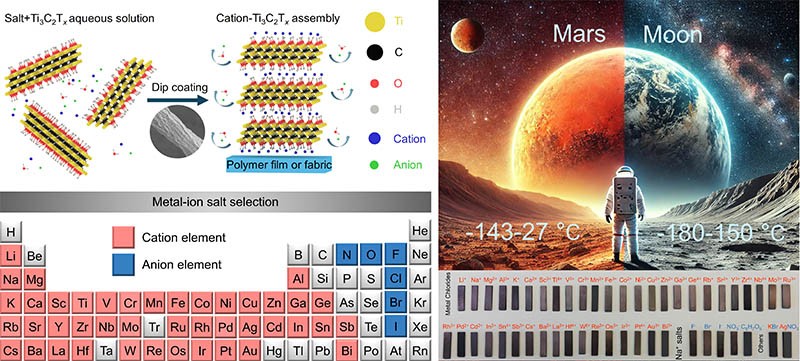Villanova University’s Research on Nanomaterial Assembly Published in Nature Communications

Credit: Liang Zhao

Bo Li, PhD
A paper led by Bo Li, PhD, associate professor of Mechanical Engineering at Villanova University, was recently published in the peer-reviewed scientific journal Nature Communications, with research conducted alongside collaborators from Drexel University, Temple University, Bryn Mawr College, and Rice University.
The paper, “Universal salt-assisted assembly of MXene from suspension on polymer substrates,” centers on the application of a hydrophilic nanomaterial to high-performance polymer surfaces. These surfaces are usually hydrophobic or chemically inert, which presents significant challenges for the adhesion of MXenes from a water-based suspension. Utilizing common table salt, Dr. Li and his team developed a dehydration-like process that enables the polymer and nanomaterial to bond. This can be used to improve thermal management on a variety of materials that are exposed to extremely hot or cold conditions.
The research, which took about three years to assemble, was inspired by Villanova Engineering PhD student and co-inventor Liang Zhao, a co-first author of the paper. Zhao had been exploring the options of nanomaterials and polymer substrates in a water-based assembly process. The most difficult cases to assemble involve hydrophilic (or water-loving) nanomaterials on hydrophobic (or water-fearing) surfaces, as the water will attack such interfaces and repel the nanomaterials. To circumvent this issue, Zhao asked the team, “Hey, why don’t we add salts?”
“The fundamental idea is more like dehydration,” Dr. Li said. “Adding salts can help create a scenario in that the polymer and the nanomaterial will dislike water and repel water from their interface to form a contact.”
A MXene, pronounced “maxene,” typically consists of a transition metal layer interwoven with carbon and nitrogen layers. Their layered structure allows them to exhibit exceptional electrical conductivity and mechanical strength. When applied onto materials used by individuals venturing into harsh conditions, MXenes can provide enhanced protection against extreme temperature fluctuations, while remaining durable, lightweight, and washable.
This innovation has a wide range of applications, Dr. Li said, such as in protective gear used by astronauts, firefighters, or soldiers, or any equipment meant to withstand the rigors of extreme heat or cold.
“Normally, people’s equipment handles temperatures around 100 degrees Celsius or 200 degrees Fahrenheit,” said Dr. Li. “Our research has successfully demonstrated that by applying a MXene coating, thermal management can effectively make it function at 400 degrees Celsius.”
Dr. Li added: “If you are on Mars, the suit made from our material can keep you warm under extremely low temperatures with pocket batteries and can block excessive radiation.”
Dr. Li noted that the research would not have been successful without close local and national collaborations. In addition to Zhao, the paper’s co-first authors included fellow PhD students Lingyi Bi from Drexel and Jiayu Hu from Temple. Yury Gogotsi, PhD, of Drexel, the inventor of MXene, serves as a corresponding author along with Dr. Li and material theorist Ling Liu, PhD, of Temple.
An expert on nanomaterials, Dr. Li joined Villanova’s Mechanical Engineering Department in 2016. He was the recipient of the 2024 Mid-Career Scholar Award, presented by the Villanova University Office of the Provost for a growing body of scholarship or creative achievement made by a mid-career faculty member.
He and his team filed one US patent in November 2022 and a US provisional patent in January 2024 for their nanomaterial assembly technology. Additionally, the team received a $50,000 grant from the National Science Foundation (NSF) to assist in conducting a market study for their patented technology. This grant supported a seven-week online training course, followed by a yearlong process in which Dr. Li and his students will try to identify the desired applications of their technology through intensive interviews with potential customers and partners.
“It was a great opportunity for me to explore a completely new mindset and focus on innovation,” said Dr. Li. “This NSF award helped us perform a thorough market study, understand the major players, and take this research to the next level.”
